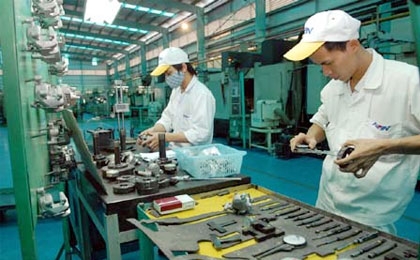Tax breaks needed for struggling firms

illustration photo (source: internet)
According to Vietnam's Tax Reform Strategy 2011-2020, one of the remarkable points is that the country planned to reduce the general tariff under the roadmap with corporate income tax (CIT) of less than 25 per cent to attract investment, facilitating enterprises to have more financial resources, increasing accumulative investment to promote development, improving competitiveness.
Regarding value added income tax (VAT), the strategy was aimed at applying basically a tax rate by 2020, not including zero per cent tax rate applied to export of goods and services.
Economic expert Pham Chi Lan said that it was reasonable that government should reduce CIT from current rate of 25 to 20 per cent.
"The high tax rate will make enterprises not have courage to make profit as well as not have capital to reinvest, so, they will have to borrow from banks. Thus, the state will suffer a loss for not collecting much from CIT," said Lan.
Tom McClelland, chairman of the Eurocham Taxation Committee, raised his voice to support the principles of the government's Roadmap for Strategic Tax Reform for period 2011-2020. However, the committee would support a reduction in the CIT rate to 20 per cent and for this to be implemented as soon as possible, instead of waiting up to10 years as the proposal, he said.
"One of the biggest positive changes in 2009 CIT Law was the reduction in the CIT rate from 28 to 25 per cent, which made Vietnam more competitive. Since that time however other countries in the region have been reducing their tax rates further," he said.
As one example, in order to improve Thailand's competitiveness prior to the implementation of the ASEAN Economic Community in January 2015 Thailand reduced its CIT rate to 23 per cent in 2012 and will reduce it further to 20 per cent starting January 1, 2013.
Meanwhile, there are still many entanglements on VAT which raised many worries for foreign investors.
International Monetary Fund (IMF) representative Sanjay Kalra said currently there were 25 groups of goods and services included non-taxable items.
International experience showed that such too many items would cause some problems on management and compliance for taxpayers, he said.
Nguyen Thi Cuc, chairwoman of the Vietnam Tax Consultant Association (VTCA) agreed and added that the application of 5 and 10 per cent caused unfairness.
"Therefore, it is necessary to reduce number of nontaxable items groups and lessen groups subject to five per cent tax rate; likely to apply one tax rate, excluding the zero rate for exports," said Cuc.
In addition, under VAT regulation since March 1, 2012 VAT was imposed on interest received enterprises not being credit institutions.
According to McClelland, no other country imposed VAT on interest. The imposition of VAT is a discouragement for foreign lenders and for Vietnamese companies obtaining funding from offshore, therefore, that application of VAT to interest should be removed as soon as possible, he said.
What the stars mean:
★ Poor ★ ★ Promising ★★★ Good ★★★★ Very good ★★★★★ Exceptional
Related Contents
Latest News
More News
- Japanese business outlook in Vietnam turns more optimistic (January 28, 2026 | 09:54)
- Foreign leaders extend congratulations to Party General Secretary To Lam (January 25, 2026 | 10:01)
- 14th National Party Congress wraps up with success (January 25, 2026 | 09:49)
- Congratulations from VFF Central Committee's int’l partners to 14th National Party Congress (January 25, 2026 | 09:46)
- 14th Party Central Committee unanimously elects To Lam as General Secretary (January 23, 2026 | 16:22)
- Worldwide congratulations underscore confidence in Vietnam’s 14th Party Congress (January 23, 2026 | 09:02)
- Political parties, organisations, int’l friends send congratulations to 14th National Party Congress (January 22, 2026 | 09:33)
- Press release on second working day of 14th National Party Congress (January 22, 2026 | 09:19)
- 14th National Party Congress: Japanese media highlight Vietnam’s growth targets (January 21, 2026 | 09:46)
- 14th National Party Congress: Driving force for Vietnam to continue renewal, innovation, breakthroughs (January 21, 2026 | 09:42)

 Tag:
Tag:















 Mobile Version
Mobile Version